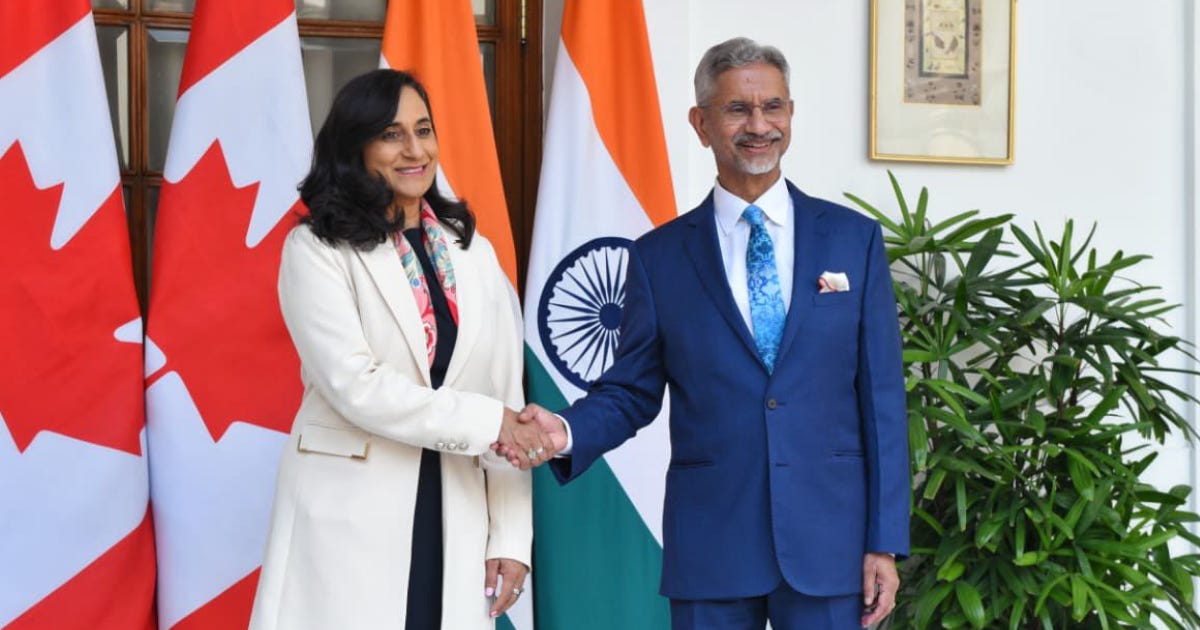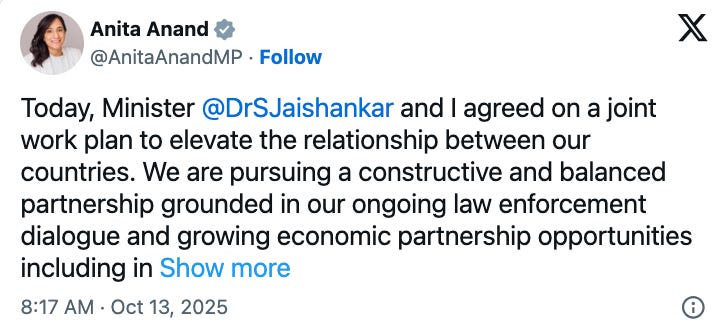Back to normal? Ottawa signs relations reset roadmap with India
Canada and India have fully restored diplomatic relations, two years after a spat over the killing of Sikh separatist Hardeep Singh Nijjar.
Canada and India have fully restored diplomatic relations, two years after a spat over the killing of Sikh separatist Hardeep Singh Nijjar, with Minister of Foreign Affairs Anita Anand meeting her Indian counterpart in New Delhi on Monday.
Anand’s trip to India follows a prolonged cooling of relations between the two countries, sparked by accusations surrounding India’s alleged involvement in the assassination of a Sikh activist on Canadian soil.
The two countries released a joint statement outlining a “New Roadmap for Canada-India Relations,” promising closer cooperation in trade, clean energy, artificial intelligence, agriculture and critical minerals. Both governments said the effort reflects “mutual respect for shared democratic values, the rule of law, and sovereignty,” and will aim to “restore stability” after years of tension.
The roadmap includes plans to restart ministerial-level trade and investment talks, relaunch the Canada-India CEO Forum early next year and re-establish the Ministerial Energy Dialogue to promote cooperation in liquefied natural gas, green hydrogen, carbon capture and nuclear energy.
In a post on X, Anand said she and Jaishankar had agreed on a “joint work plan to elevate the relationship,” emphasizing law enforcement collaboration and economic opportunities in energy, trade and artificial intelligence.
The renewed engagement follows Prime Minister Mark Carney’s September meeting with Indian Prime Minister Narendra Modi on the sidelines of the G7 Summit in Alberta, where both leaders agreed to “calibrated measures” to rebuild trust and reappoint high commissioners.
The diplomatic progress comes with shifting public sentiment in Canada.
A new Angus Reid Institute survey, conducted with the Asia Pacific Foundation of Canada, found 51 per cent of Canadians believe restoring diplomatic ties with India was the “right move,” compared to 22 per cent who disagreed.
The poll also shows Canadians are now evenly split between prioritizing human rights and trade in the relationship — 52 per cent versus 48 per cent. Last year, nearly two-thirds placed greater emphasis on rights and the rule of law.
India’s External Affairs Ministry said the new roadmap would “mitigate vulnerabilities from shifting global alliances” and strengthen strategic stability. The plan includes a Critical Minerals Annual Dialogue in Toronto in March 2026, and continued discussions between Canadian uranium suppliers and India’s Department of Atomic Energy.
Sikh advocacy groups raised concerns about the diplomatic reset. The World Sikh Organization of Canada was “deeply concerned” the agreement did not address alleged Indian interference in Canada or threats to Sikh communities.
“Canadian Sikhs continue to face ongoing threats and criminal activity directed by India,” said WSO president Danish Singh in a statement. “Our government cannot pretend that everything is back to normal while transnational repression is ongoing.”
Both governments called the agreement a pragmatic step. In their joint statement, Anand and Jaishankar said the renewed partnership “will not only create opportunities for enhanced economic cooperation but also help ensure reliable supply chains and reinforce strategic stability.”





Nothing normal about what Ottawa does these days.
NOTHING... PERIOD!!!!
I guess one of the Liberal backroom boys finally counted the population of Surrey and Brampton, huh?